A Quote by Kobe Bryant
I won’t react to something just because I’m supposed to, because I’m an African-American.
Quote Topics
Related Quotes
That argument doesn’t make any sense to me. So we want to advance as a society and as a culture, but, say, if something happens to an African-American, we immediately come to his defense? Yet you want to talk about how far we’ve progressed as a society? Well, if we’ve progressed as a society, then you don’t jump to somebody’s defense just because they’re African-American. You sit and you listen to the facts just like you would in any other situation, right? So I won’t assert myself.
I use African-American, because I teach African Studies as well as African-American Studies, so it's easy, neat and convenient. But sometimes, when you're in a barber shop, somebody'll say, "Did you see what that Negro did?" A lot of people slip in and out of different terms effortlessly, and I don't think the thought police should be on patrol.
I don't regret the fervor, because I do believe, in the African American community but also for other communities, and I know from talking to people, for communities around the world, the election of an African American to the most powerful office on Earth meant things had changed, and not just in superficial ways. That in some irreversible way the world was different.
Race is still a powerful force in this country. Any African American candidate, or any Latino candidate, or Asian candidate or woman candidate confronts a higher threshold in establishing himself to the voters ... Are some voters not going to vote for me because I'm African American? Those are the same voters who probably wouldn't vote for me because of my politics.
I find that people today tend to use them interchangeably. I use African-American, because I teach African Studies as well as African-American Studies, so it's easy, neat and convenient. But sometimes, when you're in a barber shop, somebody'll say, "Did you see what that Negro did?" A lot of people slip in and out of different terms effortlessly, and I don't think the thought police should be on patrol.































